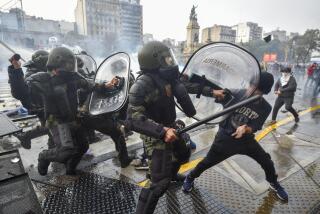Most of Argentina Is Shut Down by Striking Unionists
- Share via
BUENOS AIRES — In a display of public discontent and strife in the ruling Peronist party, a general strike led by Peronist labor unions on Thursday shut down much of Argentina.
Tens of thousands of protesters mobilized by labor’s political machine filled the Plaza de Mayo, the government square that is the center stage of Argentine politics. They pounded drums, ignited fireworks and chanted their anger over 17% unemployment and proposed cuts in workers’ benefits.
The 36-hour general strike deepens the difficulties of President Carlos Menem.
In recent months, his administration has endured an earlier strike, approval ratings below 20% and an unprecedented “blackout” in which millions of Argentines turned off their lights to protest economic stagnation and a political class perceived as insensitive.
“There is a lot of discontent,” said Hector Perez, 46, a worker in a glass factory and one of the hundreds of volunteer security guards deployed in the plaza by the General Confederation of Labor. “Menem won with the votes of the workers, and now he is killing the workers. He is no longer a Peronist.”
With three years left to govern, the charismatic Menem confronts surprising levels of social tension.
His free-market reforms slashed runaway inflation but are now blamed for harsh times experienced by the middle- and working-classes. The resulting division in Peronist ranks is reflected by the emerging defiance of labor leaders, obedient allies of the president during most of his seven years in office.
“The confrontation with the unions touches a critical nerve of the Peronist movement,” pollster Manuel Mora y Araujo said.
The glum and uncertain national mood has fomented rumors that Menem might sidestep opposition in Congress, where his Justice Party holds the majority, and begin to rule by decree.
The government denies such plans, and Mora said he doubts that the crisis will become so extreme.
“There has been a change in political culture,” Mora said. “In the past, people would start saying that the government has to go. The government might have to step down and the military would take over. Today, there is no danger of that.”
Thursday’s events suggested that Argentine politics and economics have evolved--but that painful changes are yet to come.
Menem, undaunted, said he will persist with plans to tighten the benefits of Latin America’s best-protected working class, reduce labor’s collective bargaining power and deregulate billion-dollar union health programs plagued by inefficiency and corruption.
Despite their general dissatisfaction, polls show that many Argentines support those specific measures.
“Our economic plan will not be changed or negotiated,” Menem said.
The president derisively described the labor action as “a touristic strike,” insinuating that it was an excuse for a long weekend. And sure enough, there was a run on travel agencies for plane and boat tickets to Uruguay, a favorite vacation spot.
Still, the size and emotion of the crowd in Plaza de Mayo was impressive.
The spectacle recalled the glory days of the labor-based Peronist movement; images of former President Juan D. Peron and his wife, Eva, decorated a giant banner strung above the speakers’ platform.
But modern times have changed and fragmented the party, some disenchanted protesters said.
“The union bosses are fakers,” said Julio Martinez, 23, a bank employee marching toward the plaza in a jacket and tie. “When they had to defend the workers, they didn’t. And now people are so upset that they finally have to respond.”










